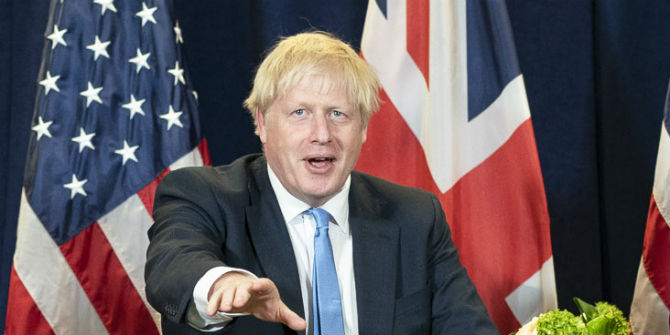 The result from last week’s vote highlights the dangers of anti-status quo politics to the public at large and the working class in particular. Alison Johnston argues that anti-status quo politics in the Brexit referendum selected false scapegoats as targets of outrage, as facts, experts and political and economic reason were drowned out by grand visions of change. She concludes that political backlash against the status quo does not always lead to positive-sum gains: rather, it may simply and solely make things worse.
The result from last week’s vote highlights the dangers of anti-status quo politics to the public at large and the working class in particular. Alison Johnston argues that anti-status quo politics in the Brexit referendum selected false scapegoats as targets of outrage, as facts, experts and political and economic reason were drowned out by grand visions of change. She concludes that political backlash against the status quo does not always lead to positive-sum gains: rather, it may simply and solely make things worse.
The end of the Brexit hangover appears to be nowhere in sight. Britons are quickly beginning to realize the gravity of this choice, with some expressing buyer’s remorse. Others are expressing buyer’s ignorance as the Leave campaign back-peddled on its major campaign promises (stopping immigration flows and shifting EU membership fees towards financing the NHS) less than 24 hours from victory (within two days, Vote Leave deleted these campaign promises from their website, removing almost the entirety of its content from the internet). After the vote, the UK’s economic standing in the world dropped behind France’s overnight, the pound’s value plummeted, and concerns have arisen about a possible constitutional crisis that could rip the UK apart and jeopardize the stability of the Northern Ireland peace agreement. What is clear, however, is that Britain has rejected the status quo and has opted to take on a new course of change.
The status quo has emerged as a popular whipping post in politics as of late, and for very good reason. Gaping income inequality, job precariousness and rising personal debt – brought on by globalization and neoliberal policies – have eroded living standards and economic security, while British politicians appear unwilling or incapable of listening to working and middle class anxieties. The tragic state of progressive politics in the UK uncovers an additional inconvenient truth. The Labour Party appears almost incapable of halting the rising tide of economic malaise of the constituents it represents, causing these constituents to flock to nationalist outlets in droves. The resignation of well over half of the shadow cabinet within 72 hours of the result provided a further proverbial nail in its political coffin.
The events of the past 72 hours demonstrate the disastrous implications of status quo politics. But they also demonstrate the disasterous implications of anti-status quo politics. Injustices have become embedded in the UK’s (and US’s) economic and political systems. Both countries are in desperate need of progressive politics that will right these wrongs. But they also are in desperate need of well-informed politics, where the problems of the status quo are well articulated and paths to right these problems are well thought out. Neither of these were on display during or after the Brexit vote. Rather, anti-status quo politicking was hijacked by a group of political opportunists with little concern for the well-being of the working and middle class. Leading faces of the Brexit campaign (who, for the most part, were not working class heroes, but former pupils of Eton with strong sympathies for unfettered capitalism) attributed underfunded public services, lack of affordable housing, and economic malaise to the EU’s status quo, when in fact these social and economic problems stem from decades of failed neoliberal policies of British governments. The Remain campaign should have denounced the hypocrisy of this blame game, but to do so would have required some of the elites within its ranks to acknowledge that their former policies had created economic losers. Anti-status quo politics were not adequately challenged in the Brexit debate, nor were the inaccuracies behind them. What is worse, the English working classes took out their legitimate political grievances on a status quo that protected their material interests against the austerity politique of their own government.
The EU has significant flaws that are in desperate need of reform. There are also, in my opinion, some EU member-states (specifically Greece) that have legitimate reasons for walking away, given the eye-watering terms of austerity that have been externally thrust upon them. But the UK’s “EU status quo” was the most generous enjoyed by the EU’s 28 member-states. Thanks to its string of opt-outs, the UK insulated itself from some of the EU’s deepest crisis points (namely the Euro-crisis and pressures on Schengen) while simultaneously receiving full access to the Single Market and the rights of EU citizens. Moreover, the EU’s Social Chapter and Working Time Directive provided the British working classes with employment protections that successive Conservative Governments, starting with Margaret Thatcher’s, have attempted to deprive them of: minimum rest breaks, protections for night and overtime work, a minimum of 4 weeks of paid annual leave, and paid maternity leave (it is no wonder that British trade unions were strong supporters of Remain). These protections do not stop at employment conditions. The EU also provided stronger consumer protections, infrastructure and development funding to its economically deprived regions (UK regions that are recipients of the EU’s Structural and Cohesion funds are currently pleading to the British government to replace them with domestic subsidies upon exit[4]), and stronger standards for clean water, air and greenhouse gas emissions than what domestic governments in Britain were willing and able to deliver. Additionally, it granted British citizens with employment rights and access to public services in all 27 EU states (including access to healthcare and health insurance). As Brexit unfolds and the EU status quo is removed, these benefits will slowly wither away. Britain will be entering a new “status quo” that will be shaped by the likes of Michael Gove, Boris Johnson and Nigel Farage. It will not be kind to the working class.
The result from last Thursday’s vote highlights the dangers of anti-status quo politics to the public at large and the working class in particular. Anti-status quo politics in the Brexit referendum selected false scapegoats as targets of outrage, as facts, experts and political and economic reason were drowned out by grand visions of change. Of course, details about what is politically and economically possible have never been inspiring compared to grand visions. But Brexit’s possible fall-out provides a lesson as to what happens when they are ignored. This political act of self-harm not only leaves the country with the causes of its status quo problems (continued austerity policies of domestic governments), but it will remove external safeguards that protect Britons from them. As America undergoes similar processes of anti-status quo politics in its presidential elections, its working and middle classes, in addition to factions of the progressive left and populist right, should take note of these lessons. Anti-status quo politics can be constructive and lead to progressive change, but this rests on the premise that the causes of the status quo are well understood, properly targeted, and not vaguely articulated. Political backlash against the status quo does not always lead to positive-sum gains: rather, it may simply and solely make things worse.
The article gives the views of the author, and not the position of BrexitVote, nor of the London School of Economics. Image credit.
Alison Johnston is an Assistant Professor of Political Science and Public Policy at Oregon State University.








This is the kind of breathless, partisan view under a veneer of academic objectivity which gives “experts” a bad name.
The author is of course quite clear on the nature of her progressivism. While offering the usual demands for change from the status quo (so usual, they are pretty much part of it), she makes clear that “anti-status quo politics” of the sort which won in the referendum are simply unacceptable — only “well-informed”, “progressive” politics can do this. But this is a rhetoric of elite reaction — the author is aghast that the status of “well-informed”, “progressive” politics, which was high in the status quo, has now been downgraded. She then chastises the Brexit vote in terms of Hirschman’s rhetoric of reaction: this “disastrous” anti-status quo politics carries perversity, futility, jeopardy.
“There are also, in my opinion, some EU member-states (specifically Greece) that have legitimate reasons for walking away…” Translation: thanks British citizens, but Oregon-based political scientist Alison Johnston has decided that Britain hasn’t been sufficiently ill-treated by the EU to accept your vote to leave. I think most of the British public (I dare say most of the American public, too) would say that democratic will is a more than legitimate reason for leaving the EU.
“Britain will be entering a new “status quo” that will be shaped by the likes of Michael Gove, Boris Johnson and Nigel Farage. It will not be kind to the working class.” Again, this is just pure opinion — no evidence is offered, just the assertion that Gove, Johnson and Farage are now regnant and will be awful. In actual fact, Parliament will shape the new status quo, and Parliament remains the same as it was before the referendum. All the referendum does is recast the overall policy direction – outside of the EU, and probably with greater immigration controls. Changes to working conditions, etc. will be subject to the same political process that they always are.
PS “who, for the most part, were not working class heroes, but former pupils of Eton with strong sympathies for unfettered capitalism” – aside from Boris Johnson, who else among leading Leave campaigners went to Eton? This is just cheap sloganeering.